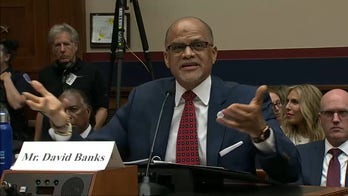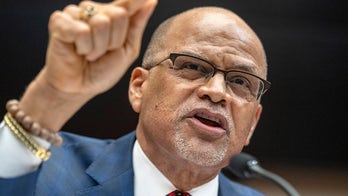Ex-spy Christopher Steele breaks silence, defends dossier
Christopher Steele tells students at Oxford University that he stands by his work and what he did; former White House Cabinet secretary under President Trump William McGinley reacts.
An agent involved in the FBI’s original Trump-Russia case left the Crossfire Hurricane team amid a "professional disagreement" with Bill Priestap, after the former assistant director of counterintelligence denied his request for an "enhanced validation review" of Christopher Steele’s reporting.
The Senate Judiciary Committee on Friday released a slew of transcripts from its inquiry into the origins and aftermath of the FBI’s investigation into whether members of President Trump’s first campaign colluded or coordinated with Russia to influence the outcome of the 2016 election.
SOURCE OF STEELE DOSSIER WAS INVESTIGATED BY FBI FOR RUSSIAN CONTACTS
One transcript made public on Friday was that of the committee’s interview on Aug. 27, 2020, with "Supervisory Special Agent 1.
During the interview, the agent described requesting a "human source validation review" on Christopher Steele in November 2016.
The agent testified that he understood that Steele "had a sub source network that provided him the reporting," and became aware that he "was collecting this information for an entity that was conducting opposition research."
Steele authored and compiled information for the controversial and unverified anti-Trump dossier on behalf of Fusion GPS — the firm that was hired to conduct opposition research funded by the Democratic National Committee and the Hillary Clinton campaign through law firm Perkins Coie.
The dossier contains claims about alleged ties between Donald Trump and Russia that served as the basis for Foreign Intelligence Surveillance Act (FISA) warrants obtained against former Trump campaign aide Carter Page.
"I recognized the significance of his reporting, the use in a FISA application," the agent testified. "I had questions about our intel validation ongoing in the Counterintelligence Division, and all of that contributed to my professional disagreement."
The agent told investigators that his disagreement was with Priestap, after he requested a "validation review" of Steele, which he said was "initiated" but "later turned off."
"There was a constant validation review ongoing by the Counterintelligence Division and the intelligence analysts at the time," the agent said. "My request was to the FBI director of intelligence, for them to do what is considered an enhanced validation review—something outside and independent of the counterintelligence division."
The agent said that Priestap and former FBI deputy assistant director of counterintelligence Peter Strzok "turned off" the validation review, and told him "there were concerns about leaks."
"The Bureau, obviously was, as I understood … concerned about anyone outside of the Crossfire Hurricane team being aware of the existence of the investigation," the agent said. "So that was one of their concerns. They wanted to keep it within the counterintelligence."
The agent told investigators that he "understood the answer" but "disagreed with it."
"This was a concern hat you were so passionate about that it made you terminate your association with the case, the team, and go back to the Washington Field Office?" The investigator asked.
GRAHAM RELEASES RUSSIA PROBE DOCS, SLAMS ORIGINAL INVESTIGATION AS 'INCOMPETENT, CORRUPT'
"It was," according to the agent, who left the Crossfire Hurricane team on Jan. 6, 2017.
Steele was not the originating source of factual information in his reporting, the agent said, which was in line with Justice Department Inspector General Michael Horowitz’s analysis in 2019, and instead relied on a primary sub source for information, who used their sub sources to gather information that was then passed to Steele, and included in the dossier.
Meanwhile, Fox News reported in September that Steele’s primary sub-source had been the subject of an FBI counterintelligence investigation from 2009 to 2011 for suspected contact with Russian intelligence officers.
And Fox News reported in July that the primary source of Steele’s election reporting was not a current or former Russian official, but a non-Russian based contract employee of Steele’s firm.
Fox News also reported in July that the information the source provided Steele that served as the basis of the dossier was "second and third-hand information and rumors at best."
The Senate Judiciary Committee last summer released a declassified summary of a three-day interview with the source.
The source, according to the committee, told the FBI in interviews in January and March of 2017 that the information contained in the anti-Trump dossier was unreliable.
The document revealed that the dossier was "unsubstantiated and unreliable," according to sources who reviewed it, and showed that the FBI was on notice of the dossier’s credibility problems, yet continued to seek further FISA warrants renewals for Page.
The document also revealed that Steele’s primary sub-source "disagreed with and was surprised by" how information he gave Steele was then conveyed by Steele in the dossier.
For instance, the source told the FBI he "did not recall" where some of the information attributed to him or his sources came from; was never told about or mentioned to Steele certain information attributed to him or his sources; said that Steele "re-characterized" some of the information to make it more substantiated and "less attenuated" than it really was; and that he would have described some of his sources differently.
The source also told the FBI, according to committee sources, that Steele "implied direct access to information where the access to information was indirect."
Justice Department Inspector General Michael Horowitz revealed last year in its review of alleged abuses of the FISA system that there were at least 17 "significant inaccuracies and omissions" in the Page FISA applications. Horowitz also found that the applications also omitted information regarding the reliability of one of Steele's key "sub-sources."
Horowitz added in his report that the key Steele "sub-source" raised questions about the reliability of Steele’s reporting, which was omitted.
Meanwhile, Director of National Intelligence John Ratcliffe last year transmitted a declassified footnote of the 2017 Intelligence Community Assessment (ICA) on Russian election interference to Capitol Hill, which noted that Steele had only "limited corroboration" and that he used "identified and unidentified sub-sources" which volunteered "highly politically sensitive information from the summer to the fall of 2016 on Russian influence efforts aimed at the presidential election."
"We have only limited corroboration of the source’s reporting in this case and did not use it to reach the analytic conclusions of the CIA/FBI/NSA assessment," the declassified annex stated.
But the annex noted that Steele's reporting was "not developed by the layered subsource network."
"The FBI source caveated that, although similar to previously provided reporting in terms of content, the source was unable to vouch for the additional information's sourcing and accuracy," the annex stated. "Hence this information is not included in this product."
Another footnote, which was previously redacted in its entirety, further raised doubt on the credibility of Steele’s main sources.
"When interviewed by the FBI, the Primary Sub-source stated that he/she did not view his/her contacts as a network of sources, [REDACTED] with whom he/she has conversations about current events and government relations," one of the previously hidden footnotes reads.
Horowitz, though, had asserted that Steele’s primary sub-source "used his/her network of sub-sources to gather information that was then passed to Steele."
Meanwhile, upon releasing the documents, Senate Judiciary Committee Chairman Lindsey Graham, R-S.C., slammed the entire Trump-Russia investigation as "one of the most incompetent and corrupt investigations in the history of the FBI and DOJ."
Last month, former Attorney General Bill Barr made public that he had appointed U.S. Attorney from Connecticut John Durham as special counsel to ensure he could continue his investigation into the origins of the Russia probe through the Biden administration.
Durham was appointed by Barr last year to investigate the origins of the FBI’s Russia probe, shortly after special counsel Robert Mueller completed his yearlong investigation into whether the Trump campaign colluded with the Russians to influence the 2016 presidential election.
Mueller’s investigation yielded no evidence of criminal conspiracy or coordination between the Trump campaign and Russian officials during the 2016 election.






